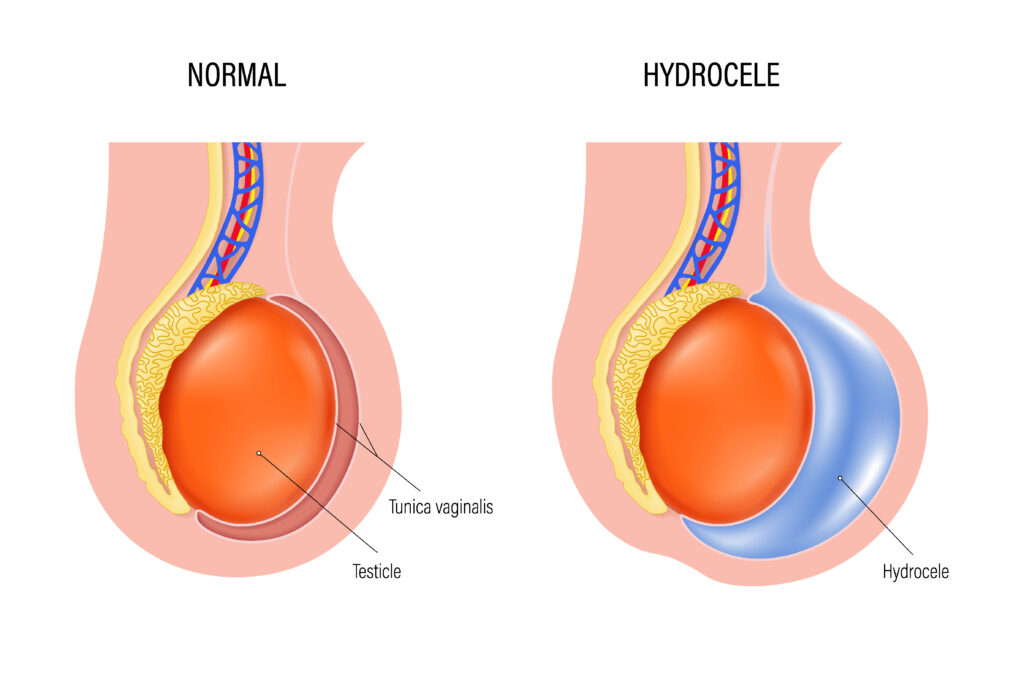- Home
- Hydrocele

Understanding Hydrocele
A hydrocele is a fluid-filled sac surrounding a testicle, causing swelling in the scrotum. It is a common condition in newborns and usually resolves on its own, but it can also occur in adult men, often due to injury or inflammation. While generally painless, a hydrocele can cause discomfort and may require treatment if it persists or becomes large.
Indications for Treatment
Hydroceles often do not require treatment if they are small and asymptomatic. However, treatment is indicated in cases where:
- Discomfort: The hydrocele causes pain or discomfort.
- Size: The swelling is large or continues to grow.
- Complications: There is a risk of infection or other complications.
- Cosmetic Concerns: The appearance of the swelling causes distress.
The Hydrocele Treatment Procedure
Treatment for a hydrocele typically involves surgical intervention to remove the fluid and prevent recurrence.
Hydrocelectomy
Hydrocelectomy is the most common surgical procedure to treat hydrocele, involving the removal of the fluid-filled sac.
Preoperative Evaluation
- Assessment: Patients undergo a thorough evaluation, including physical examination and imaging studies (such as ultrasound) to confirm the diagnosis and plan the procedure.
- Preparation: Patients receive pre-operative instructions, which may include fasting guidelines and medication adjustments.
Surgical Procedure
- Anesthesia: General or regional anesthesia is administered to ensure the patient is comfortable and pain-free during the procedure.
- Incision: The surgeon makes a small incision in the scrotum or lower abdomen to access the hydrocele.
- Drainage and Removal: The fluid is drained, and the hydrocele sac may be removed or repositioned to prevent fluid accumulation.
- Closure: The incision is closed with sutures, and a sterile dressing is applied.
- Duration: The procedure typically takes about 30 to 60 minutes.
Postoperative Care
- Recovery: Patients are provided with instructions on caring for the incision site, managing discomfort, and monitoring for signs of infection.
- Pain Management: Over-the-counter pain relievers or prescribed medications may be recommended to manage postoperative discomfort.
- Activity Restrictions: Patients should avoid strenuous activities and heavy lifting for a few weeks to allow proper healing.
- Follow-Up Care: Scheduling follow-up appointments to monitor healing and discuss any concerns.
Potential Risks and Complications
While hydrocelectomy is generally safe, it carries certain risks and potential complications, including:
- Infection: At the surgical site, which may require antibiotics.
- Bleeding: Excessive bleeding may occur, necessitating further medical attention.
- Scrotal Injury: Rare but possible injury to the surrounding tissues.
- Recurrence: The hydrocele may reoccur, requiring additional treatment.
- Swelling and Bruising: Temporary swelling and bruising in the scrotal area.
Why Choose Neo TrueNorth for Your Hydrocele Treatment?
- Experienced Surgeons: Our board-certified urologists specialize in treating hydroceles with precision and care.
- Advanced Diagnostic Tools: Neo TrueNorth is equipped with state-of-the-art diagnostic technology to accurately evaluate hydroceles and plan effective treatment.
- Personalized Care: We provide individualized care plans tailored to each patient’s unique needs and health status, ensuring the best possible outcomes.
- Comprehensive Support: Our multidisciplinary team offers comprehensive support, including pre-operative counseling, post-operative care, and follow-up consultations, to ensure a positive surgical experience.
- State-of-the-Art Facilities: Neo TrueNorth is equipped with modern surgical facilities and the latest technology to provide safe and successful hydrocele treatment in a comfortable environment.
Trust Neo TrueNorth for expert care in hydrocele treatment. Contact us today to schedule a consultation and learn more about your treatment options.
Meet Our Experts

Dr Venkataramana
Laproscopic Surgeon

Dr. Poornima
General Surgeon



